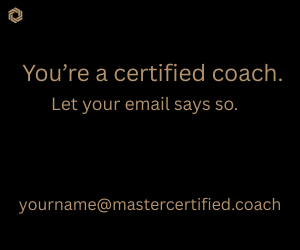In their latest Future of Jobs report, The World Economic Forum predicts that artificial intelligence (AI) could displace up to 14 million jobs over the next five years. And with AI making advancements in mimicking human conversations, human coaches may understandably be worried that coaching chatbots and other emerging technologies may negatively affect their profession, or even make their role obsolete.
Indeed, AI has made significant strides, enabling machines to perform complex tasks and mimic human behavior. Natural Language Processing (NLP) algorithms, machine learning, and predictive analytics have enhanced AI’s ability to understand and respond to human interactions.
With that said, human coaches have something unique — emotional intelligence and empathetic understanding — that surpasses AI capabilities. The ability to build trust, establish rapport, and navigate complex emotions and situations is still a vital aspect of coaching that AI cannot fully replicate.
With that said, how can AI assist human coaching? Here are some ways AI can complement your professional practice and simplify your business tasks.
Coaching and Client Relationships
AI can help you manage and enhance your client relationships in a number of ways. For example, AI chatbots can reinforce the content of coaching sessions for clients by delivering information, reminders, or basic guidance between sessions, boosting the likelihood of long-term behavior change.
By combining AI-driven insights with your own expertise, you can gain a more comprehensive understanding of your how own performance and make informed decisions for improvement. AI can track client progress and remind you of content discussed in prior sessions, increasing coaching efficacy. AI can also analyze conversations and provide information at the end of a coaching session. It can help you see how much time was allocated to a specific topic or identify the speaking duration of both you and your client for each session.
AI can also offer you feedback in real time. Because AI can review large quantities of data at a rapid pace, it can scan an entire coaching session transcript to provide the highlights, or to identify patterns, trends, and areas for improvement. This real-time feedback can be invaluable for you to make immediate adjustments and finetune your coaching approach.
At the end of the day, being thoughtful and intentional is key: how can you integrate AI and technology into the coaching process so that you are not compromising the powerful personalized and human-centered aspects of coaching?
Supporting Your Daily Business Needs
According to the 2023 ICF Snapshot: Future of Coaching report, 29% of respondents agreed or strongly agreed with the proposition that AI will make it easier to run their coaching business. Here are three ways you can consider incorporating AI into your business:
- Complete Administrative Tasks: AI chatbots can assist with front-end administrative tasks such as intake and onboarding, as well as ongoing tasks related to scheduling and billing.
- Market Your Business: You can use AI to create, repurpose, and reuse images, text, and video for various contexts, from on-demand learning materials, blog posts, and newsletters, to social media promotion.
- Prepare for Client Engagements: AI-driven coaching platforms can help you prepare for sessions by organizing client information and providing real-time data on client needs and progress.
AI advancements have the potential to enhance coaching processes, but it is unlikely to replace human coaches completely. The coaching profession relies on human heart and social intelligence. The human element remains a fundamental aspect of successful coaching outcomes — the unique abilities of human coaches to establish trust, build relationships, and adapt to individual needs cannot be replicated by AI.
Explore more about coaching trends, challenges, and AI’s possibilities at the ICF Thought Leadership’s Global Digital Library.
Disclaimer
The views and opinions expressed in guest posts featured on this blog are those of the author and do not necessarily reflect the opinions and views of the International Coach Federation (ICF). The publication of a guest post on the ICF Blog does not equate to an ICF endorsement or guarantee of the products or services provided by the author.
Additionally, for the purpose of full disclosure and as a disclaimer of liability, this content was possibly generated using the assistance of an AI program. Its contents, either in whole or in part, have been reviewed and revised by a human. Nevertheless, the reader/user is responsible for verifying the information presented and should not rely upon this article or post as providing any specific professional advice or counsel. Its contents are provided “as is,” and ICF makes no representations or warranties as to its accuracy or completeness and to the fullest extent permitted by applicable law specifically disclaims any and all liability for any damages or injuries resulting from use of or reliance thereupon.
Authors
Post Type
Blog
Audience Type
Coach Educators, Experienced Coaches, External Coaches, HR & Organizational Leaders, ICF Assessors, ICF Chapter Leaders, Individuals Interested in Experiencing Coaching, Internal Coaches, Managers/Leaders Using Coaching Skills, Mentor Coaches, New Coaches, Professional Coaches, Team and Group Coaches
Topic
Future of Coaching, Industry Disruption and Innovation
Related Posts
Walking the Talk: Reflective Practice for Coaches
Embodying presence and self-care through ICF Competency 2. This article explores how…
Why Transformational Coaching Will Always Be Human
As artificial intelligence (AI) gains power and popularity, many coaches are asking,…
Coaching for Growth at Alberta’s Municipal Climate Change Action Centre
It started with two colleagues sharing a passion for sustainability. Professional coach…








